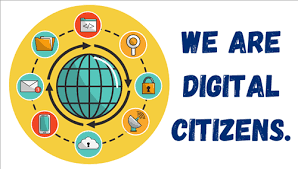🌸Digital citizenship🌸
Self-Introspection☺
∼∼ ∼∼❤∼∼∼∼∼
Digital citizenship is a multifaceted concept that has
become increasingly important in our rapidly evolving technological landscape.
In this reflection, I will delve into the complexities of digital citizenship,
explore the role of teachers in fostering it, discuss the rights and
responsibilities associated with it, and share personal observations and
learning experiences regarding today's generation's use of digital technology.
In todays class I learned about the Digital citizenship which is the ability to engage positively,critically and competent in the digital environment. It goes beyond simply knowing how to
use digital tools; it involves understanding the implications of one's actions
online and engaging in digital spaces in ways that uphold respect, empathy, and
integrity. In today's interconnected world, where the internet and digital
devices play integral roles in our daily lives, digital citizenship is more
crucial than ever. I also came to know the 9 elements of digital citizenship like
👉Digital access,
👉 Digital Commerce
👉Digital Communication
👉Digital Rights and Responsibilities
👉Digital etiquettes,
👉Digital Law
👉 Digital health and wellness
👉Digital Literacy
👉Digital security.
As a future teacher, I recognize the significant role I must play in
shaping students' digital citizenship skills. In addition to imparting academic
knowledge, I have a responsibility to educate students about navigating the
digital world responsibly and ethically. This involves teaching them how to
critically evaluate online information, discern between credible and unreliable
sources, and protect their privacy security online,protect their personal information, and recognize and respond to online threats such as cyberbullying and phishing scams.
It also entails
fostering empathy and respect in online interactions, emphasizing the
importance of treating others with kindness and dignity in digital spaces. By
integrating digital citizenship education into the curriculum, I aim to empower my future students to become responsible digital citizens who contribute positively to
online communities and society as a whole.
Additionally, teachers can serve as role
models for responsible digital behavior, demonstrating ethical online practices
and fostering a culture of respect and responsibility in the classroom and
beyond. Furthermore, teachers play a crucial role in promoting
digital rights and responsibilities both locally and globally. In their
communities, teachers can advocate for policies and programs that protect
individuals' online privacy, freedom of expression, and access to information.
In addition, like in my country, Bhutan, some schools are located in remote areas so for inclusive learning there should be equity where every learner can access information equally by collaborating with policymakers, community leaders, and other stakeholders, teachers can help promote equitable access to technology and information and address digital inequalities.
By championing digital inclusion, teachers can help bridge the digital divide and empower individuals to participate fully in the digital world.
In observing today's generation's use of digital technology,
I have witnessed young people using digital tools and platforms to access
educational resources, collaborate on projects, and for entertainment.
Social media platforms, in particular, have become powerful tools for raising
awareness about important social issues and connecting with like-minded
individuals globally, facilitating activism and social change. However, there are also instances of negative behaviors such
as cyberbullying, online harassment, and the spread of misinformation.
These
challenges underscore the importance of comprehensive digital citizenship
education that equips students with the skills and values needed to become responsible digital citizens. By teaching students how to critically evaluate
online information, engage in respectful online interactions, and protect their
privacy and security online, teachers can empower them to become responsible
digital citizens who contribute positively to society.

In my experience, I have found that incorporating digital
citizenship education into the curriculum can be highly effective in promoting
responsible digital behavior among students. By integrating lessons on digital
literacy, online safety, and ethical online behavior into various subject
areas, teachers can help students develop the skills and knowledge they need to
navigate the digital world effectively. Additionally, providing opportunities
for students to engage in discussions and activities that promote critical
thinking and digital responsibility can further reinforce these concepts and
empower students to make informed decisions online.
, 💛〰〰〰🌼〰〰〰💛
Overall, By teaching students how to critically
evaluate online information, engage in respectful online interactions, and
protect their privacy and security online, teachers can help prepare them to
become responsible digital citizens who contribute positively to society. As
educators, we have a responsibility to ensure that all students have the skills
and knowledge they need to thrive in today's digital world and to advocate for
policies and initiatives that promote digital rights and responsibilities on a
broader scale.
Thank You 😀(All the pictures are extracted from Google)
.jpg)





No comments:
Post a Comment